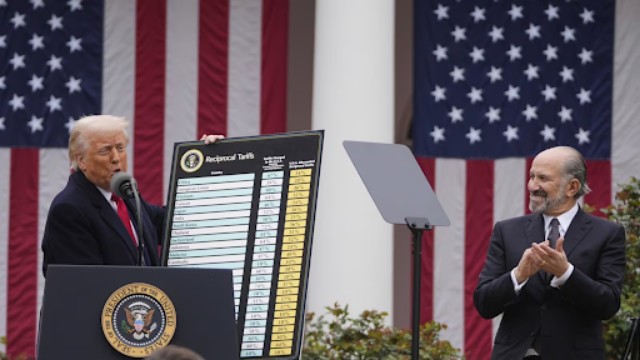
President Donald Trump speaks at the White House Rose Garden on Wednesday, April 2, 2025, where he announced new tariffs. Commerce Secretary Howard Lutnick stands nearby, listening during the event. (AP Photo/Mark Schiefelbein)
JPMorgan Chase has issued a stark warning: the United States is likely heading into a recession this year, and the trigger could be the new round of tariffs announced by former President Donald Trump.
According to Michael Feroli, JPMorgan’s chief U.S. economist, the country's economy may shrink instead of grow. In a note to clients shared Friday, he said the bank now expects a 0.3% drop in real GDP by the end of the year—down from the previous growth forecast of 1.3%. The updated prediction comes just days after Trump revealed plans for steep tariffs on key trading partners.
Feroli explained that the expected downturn in economic activity would likely slow down hiring across industries. Over time, the bank sees unemployment rising to 5.3% from its current level.
The impact of Trump's tariff announcement was felt almost immediately. Following the news on Wednesday, the S&P 500 index tumbled to its lowest point in nearly a year. Over just two trading days, the U.S. stock market lost a staggering $5.4 trillion in value.
JPMorgan isn’t alone in lowering its growth expectations. Barclays now expects the U.S. to face a recession in 2025, citing the same concerns around tariffs. Meanwhile, economists at Citi have trimmed their outlook for 2024 growth to a mere 0.1%.
Feroli described the situation as a "stagflationary" scenario—a combination of rising inflation and a slowing economy. He believes the Federal Reserve will start reducing interest rates as early as June to support the economy. If that happens, more cuts could follow at every Fed meeting through January, potentially lowering the benchmark interest rate from its current 4.25%-4.5% range to around 2.75%-3%.
This comes despite expectations that inflation could rise to 4.4% by the end of the year, up from 2.8% today. Feroli noted that this mix of slow growth and rising prices presents a tricky challenge for the Federal Reserve. However, he thinks the weakening job market could take priority and push the Fed to act. If wage growth also slows down, policymakers may feel more comfortable that inflation won’t spiral out of control.
Fed Chair Jerome Powell spoke on Friday, saying there’s no urgency to change interest rates immediately. His comments followed the release of new job numbers showing strong hiring in March, although unemployment did tick up slightly to 4.2%.
Despite Powell’s cautious tone, investors are still betting that the Fed will cut interest rates by a full percentage point before the year ends.















